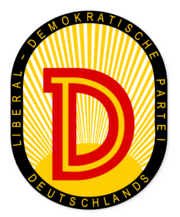Liberal-Demokratische Partei Deutschlands
|
Liberal Democratic Party of Germany
Liberal-Demokratische Partei Deutschlands |
|
|---|---|
 |
|
| Chairman |
Waldemar Koch (1945) Wilhelm Külz (1945-1948) Arthur Lieutenant (1948-1949) Karl Hamann, Hermann Kastner (1949-1952) Hans Loch (1952-1960) Max Suhrbier (1960-1967) Manfred Gerlach (1967-1979) Unknown (1979-1989) Rainer Ortleb (1989-1990) |
| Founded | July 1945 |
| Dissolved | 11 August 1990 |
| Merged into | Free Democratic Party |
| Headquarters | East Berlin, East Germany |
| Membership (1987) | 106,000 |
| Ideology | Liberalism |
| National affiliation |
Democratic Bloc (1945–1950) National Front (1950–1990) Association of Free Democrats (1990–1991) |
| International affiliation | None |
| Colours | Black, red, yellow (National colours) |
| Party flag | |
 |
|
The Liberal Democratic Party of Germany (German: Liberal-Demokratische Partei Deutschlands, LDPD) was a political party in East Germany. Like the other allied bloc parties of the Socialist Unity Party of Germany (SED) in the National Front, it had 52 representatives in the People's Chamber.
The history of the party dates back to 16 June 1945, when a Berlin-based group led by Waldemar Koch and his father-in-law Eugen Schiffer took the initiative in refounding the Weimar-era German Democratic Party. Koch was elected chair of the founding committee, with Wilhelm Külz as his deputy; the writer Franz Xaver Kappus joined the board as well. At first there were some conversations about forming a united center-right democratic party with the Christian Democrats, but the idea was abandoned soon and the name was changed to Liberal Democratic Party ("Liberal-Demokratische Partei", LDP) before the party's official founding on 5 July 1946.
It was first of all aimed at uniting Weimar Republic-era members of the German Democratic Party, German People's Party and German National People's Party. Unlike the East German Christian Democratic Union (CDU), the Liberal Democratic Party was firmly for private ownership and opposed to nationalization of important private enterprises. Among the new anti-fascist parties, Liberal Democratic Party was the most anti-communist at the time.
...
Wikipedia
